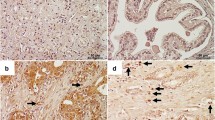Abstract
Objective
Recent evidence suggests that Oct-4 is highly expressed in several cancers, and its expression contributes to tumor growth. In this study, we investigated the level of Oct-4 expression in rectal adenocarcinoma, and evaluated the prognostic significance of Oct-4 expression in these cases.
Methods
The immunohistochemical expression of Oct-4 was evaluated in 52 formalin-fixed paraffin-embedded postoperative rectal adenocarcinoma tissue samples. The impact of the immunoreactivity of Oct-4 in regard to clinical outcome was determined by Kaplan-Meier and log-rank.
Results
The expression level of Oct-4 ranged from 0 to 18.5%. There was no significant association between Oct-4 expression and gender (P=0.772), age (P=0.123), clinical stage (P=0.391), and histological grade (P=0.056). The 3-year local recurrence-free rates with negative and positive expression of Oct-4 were 83.5% and 75.0%, respectively (P=0.583). The 3-year metastasis-free rates with negative and positive expression of Oct-4 were 88.6% and 61.9%, respectively (P=0.035). The 3-year overall survival rates with negative and positive expression of Oct-4 were 77.9% and 49.0%, respectively (P=0.037).
Conclusion
The results suggest that embryonic stem cell marker Oct-4 expression may have prognostic significance in patients with rectal adenocarcinoma. However, to confirm this more and larger studies are required.
Similar content being viewed by others
References
Jemal A, Siegel R, Ward E, et al. Cancer statistics, 2006[J]. CA Cancer J Clin 2006; 56: 106–130.
Ieta K, Tanaka F, Haraguchi N, et al. Biological and genetic characteristics of tumor-initiating cells in colon cancer[J]. Ann Surg Oncol 2008; 15: 638–648.
O’Brien CA, Pollett A, Gallinger S, et al. A human colon cancer cell capable of initiating tumor growth in immunodeficient mice[J]. Nature 2007; 445: 106–110.
Jordan CT, Guzman ML, Noble M. Cancer stem cells[J]. N Engl J Med 2006; 355: 1253–1261.
Rich JN. The cancer stem cell: a new therapeutic paradigm[J]? Expert Rev Anticancer Ther 2006; 6: 1531–1533.
Bao S, Wu Q, Mclendon RE, et al. Glioma stem cells promote radioresistance by preferential activation of the DNA damage response[J]. Nature 2006; 444: 756–760.
Collins AT, Berry PA, Hyde C, et al. Prospective identification of tumorigenic prostate cancer stem cells[J]. Cancer Res 2005; 65: 10946–10951.
Zeppernick F, Ahmadi R, Campos B, et al. Stem cell marker CD133 affects clinical outcome in glioma patients[J]. Clin Cancer Res 2008; 14: 123–129.
Rosner MH, Vigano MA, Ozato K, et al. A POU-domain transcription factor in early stem cells and germ cells of the mammalian embryo[J]. Nature 1990; 345: 686–692.
Schöler HR, Ruppert S, Suzuki N, et al. New type of POU domain in germ line-specific protein Oct-4[J]. Nature 1990; 344: 435–439.
Covello KL, Kehler J, Yu H, et al. HIF-2α regulates Oct-4: effects of hypoxia on stem cell function, embryonic development, and tumor growth[J]. Genes & Development 2006; 20: 557–570.
Atlasi Y, Mowla SJ, Ziaee SA, et al. Oct-4, an embryonic stem cell marker, is highly expressed in bladder cancer[J]. Int J Cancer 2007; 120: 1598–1502.
Gibbs CP, Kukekov VG, Reith JD, et al. Stem-like cells in bone sarcomas: implications for tumorigenesis[J]. Neoplasia 2005; 7: 967–976.
Gidekel S, Pizov G, Bergman Y, et al. Oct-3/4 is a dose-dependent oncogenic fate determinant[J]. Cancer Cell 2003; 4: 361–370.
Clarke MF, Dick JE, Dirks PB, et al. Cancer stem cells- perspectives on current status and future directions: AACR workshop on cancer stem cells[J]. Cancer Res 2006; 66: 9339–9344.
Okita K, Ichisaka T, Yamanaka S. Generation of germ-line-competent induced pluripotent stem cells[J]. Nature 2007; 448: 313–317.
Park IH, Zhao R, West JA, et al. Reprogramming of human somatic cells to pluripotency with defined factors[J]. Nature 2008; 451: 141–146.
Chiou SH, Yu CC, Huang CY, et al. Positive correlations of Oct-4 and Nanog in oral cancer stem-like cells and high-grade oral squamous cell carcinoma[J]. Clin Cancer Res 2008; 14: 4085–4095.
Ezeh UI, Turek PJ, Reijo RA, et al. Human embryonic stem cell genes OCT4, NANOG, STELLAR, and GDF3 are expressed in both seminoma and breast carcinoma[J]. Cancer 2005; 104: 2255–2265.
Guo Y, Mantel C, Hromas RA, et al. Oct-4 is critical for survival/antiapoptosis of murine embryonic stem cell subjected to stress: effects associated with Stat3/Survivin[J]. Stem Cells 2008; 26: 30–34.
Author information
Authors and Affiliations
Corresponding author
Additional information
This work was supported by the grant from Jiangsu Natural Science Program(No. BK2009126).
Rights and permissions
About this article
Cite this article
Xing, Cg., Lu, Xg., Zhang, Ys. et al. Expression of embryonic stem cell marker Oct-4 and its prognostic significance in rectal adenocarcinoma. Chin. J. Cancer Res. 22, 106–111 (2010). https://doi.org/10.1007/s11670-010-0106-8
Received:
Accepted:
Published:
Issue Date:
DOI: https://doi.org/10.1007/s11670-010-0106-8




